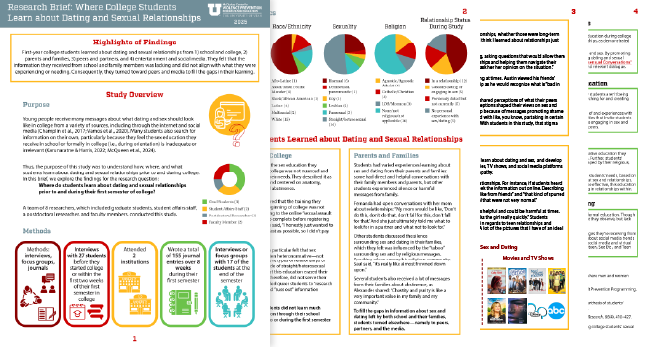How College Students Learn About Healthy Sex and Relationships: Insights & Statistics
Blog #5
By: Joan Tabachnick, MBA & Jenny Coleman, LMHC
A group of faculty and student researchers at the University of Utah explored how and where first-year college students learned about dating and sexual relationships. You can view a short infographic summarizing study findings and read their research brief about where college students learned about dating and sex. What did they find?
WHERE and HOW did college students learn about dating and sexual relationships?
As you might expect, students learned about these important and intimate questions about healthy relationships and sex through a variety of sources:
- Schools
- Parents and extended families
- Peers and partners
- Entertainment and social media
It will not be surprising to most of us that the students interviewed felt that the school curriculum was “watered down and centered on anatomy, puberty, STIs, and abstinence.” Students reported a variety of experiences with parents and families. Some had helpful and meaningful conversations and others experienced profound silence and, at times, difficult messages from their families.
Students reported learning from their peers, watching their peers, and from navigating their own relationships over time. They felt they could ask questions of their friends to learn about sex, dating, and relationships to ultimately understand their own desires. One student heard from a friend: “It’s more than ok to stand up for yourself and communicate that to the other person.”
The largest “educator” was the entertainment industry and social media. Movies, TV shows, and social media offered an opportunity for students to connect with one another and were widely used to fill in gaps of knowledge about sex and relationships. However, college students acknowledged that information was not always helpful. Some of the depictions of relationships were unrealistic and rarely did they show any concept of consent.
What healthy relationship and sex advice did college students offer to other freshman students?
Research has shown that students' perception of other college student’s relationships and sex are not fully accurate. To counter some of these misperceptions, these faculty and student researchers offered clear messages about what students should be hearing:
- Contrary to media messages, students don’t have to participate in hook-up culture to be a “real” college student.
- There are many types of relationships, but at their core, they need to be mutually respectful and consensual.
- If you did not get what you need from sex education from your parents or from school, there are places to get what you need. They offered great sources including Scarleteen, Our Bodies Ourselves, OneLove, as well as their own college Instagram account.
What does Stop It Now! add to the conversation about healthy college sex and relationships?
When a student has experienced sexual abuse or if they have concerns or questions about their own thoughts, feelings, or desires, this research and these resources don’t dive deeply into that impact. Stop It Now! and their program for youth, WhatsOK?, offer additional insights and resources to this conversation.
WhatsOK? offers an additional safety net for students (14-22 years) who are at-risk of causing harm or have concerns about themselves or a friend. The website provides accurate, age-appropriate information offering guidance for young people with questions about sexual thoughts, behaviors, and healthy boundaries, with a confidential text, chat, phone, and email helpline for personalized support and answers to questions about sexual behavior and safety.



